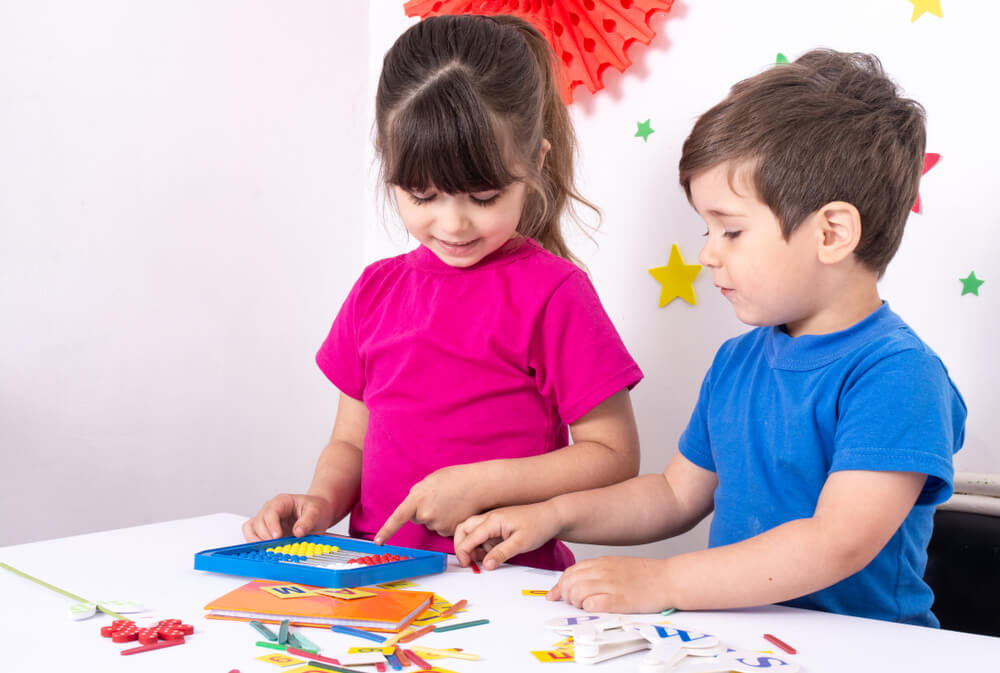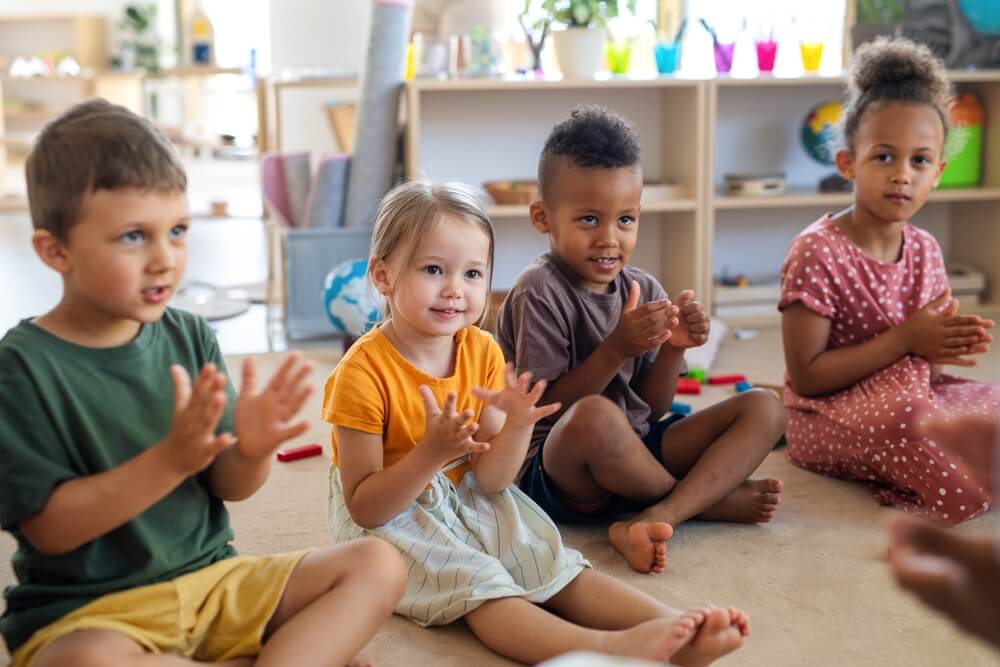When and How: Understanding the Preschool Age Range

As your child approaches preschool age, which is between two and three years old, you may begin to wonder if now is the right time to send them to preschool. Deciding to begin preschool depends more on your child’s development and readiness for school rather than if they have reached preschool age.
In this article, we’ll discuss how to know when the right time to send your child to preschool is and more.
Contents:
- Preschool vs. Pre-K: Are They the Same?
- What are the Benefits and Disadvantages of Preschool?
- Is Preschool Required?
- What Age Do Children Start Preschool?
- Preparing Your Child for Preschool
- Preschool Child Skills and Milestones
- FAQ
Preschool vs. Pre-K: Are They the Same?

Studio Romantic/Shutterstock.com
Preschool and pre-kindergarten, often referred to as Pre-K, are both early childhood education programs, but they serve different purposes and cater to different age groups.
Preschool programs typically cater to children from ages two to four and focus on providing a nurturing environment where children can learn through play and social interaction.
Pre-K, on the other hand, is designed for children who are a year or two away from entering kindergarten, typically ages four to five. The curriculum in
Pre-K is more structured and academic-focused than preschool, preparing children for the transition to kindergarten by introducing them to skills like basic math and literacy.
Another key difference lies in the duration of the programs. Preschool can be a part-time or full-time program, depending on the family’s needs, while Pre-K is typically a full-day program that mirrors the traditional school day. This difference in schedule can be a deciding factor for many parents.
Lastly, preschool programs are often more flexible in terms of enrollment, with rolling admissions throughout the year. Pre-K programs, however, usually follow the traditional school year and have specific enrollment periods.
Understanding these differences can help parents make informed decisions about which program is the best fit for their child.
What are the Benefits and Disadvantages of Preschool?

Fh Photo/Shutterstock.com
As with everything, there are advantages and disadvantages of sending your child to preschool when they are of preschool age. We’ll explore them to help you decide whether it’s time to enroll your child.
+ Social and Emotional Skill Development
One of the primary benefits of preschool is the development of social and emotional skills. In a structured setting, children learn to share, cooperate, and take turns. They learn how to manage their feelings, build relationships with other children and adults, and gain a sense of self-confidence and self-esteem.
+ Build an Academic Foundation
Preschool also provides a foundation for learning, both socially and academically. Young children are naturally curious and observant. They want to learn the skills that their families and society value, such as reading the alphabet or counting. Preschool allow children to acquire these skills in a safe and structured environment, fostering an enthusiasm for lifelong learning.
+ Promote Independence
Children in preschool get to make choices and engage in activities that interest them, fostering their decision-making skills and independence. They can select activities and materials that interest them, and they learn to manage their time and make plans.
+ Develop Motor Skills
Preschool also helps children develop fine and gross motor skills. Through activities like cutting with scissors or running on the playground, children refine their coordination and control. This physical development is important not only for children’s overall health but also for cognitive development.

Yuliia Yuliia/Shutterstock.com
– Separation Anxiety
While preschool offers numerous benefits, it also has its downsides.
One potential issue is that some children may not be emotionally ready for preschool. They might experience separation anxiety, which can interfere with their ability to learn and socialize. Therefore, understanding your child’s emotional readiness is crucial.
– Academic Learning Too Early
Another potential disadvantage is prematurely thrusting children into an academic setting. Some preschool programs are more academically focused, which can be overwhelming for young children not yet accustomed to a structured learning environment. To ensure the right fit, parents should carefully consider a preschool’s curriculum and overall approach to early childhood education.
– Lack of One-on-One Interaction
A further drawback might be the lack of one-on-one interaction in larger preschool classes. Crowded classrooms might not provide enough individual attention to each child, which is essential for young learners. This lack of individual attention can hinder children’s progression, as they may not receive the focused guidance they need. As such, it’s vital to consider the student-teacher ratio when selecting a preschool.
Is Preschool Required?

Ground Picture/Shutterstock.com
While attending preschool is not a legal requirement, it can be instrumental in nurturing your child’s overall progress and readiness for formal schooling.
Exposure to numbers, letters, and vital social and emotional concepts, hands-on, serves to build a foundation for kindergarten learning.
While preschool isn’t mandatory, its benefits in preparing early learners are notable and impactful in facilitating an easy, successful transition into kindergarten.
What Age Do Children Start Preschool?
The typical age range for preschool varies somewhat depending on the specific program and the child’s development, but generally, it is between 3 and 5 years old. This is the age when children are usually ready to engage in a structured learning environment outside of the home.
However, it’s important to remember that every child is unique and develops independently. Some children may be ready for preschool earlier, while others may benefit from waiting until they are older.
Parents should consider their child’s individual needs and readiness when deciding when to start preschool.
How to Know if Your Child is Ready to Begin Preschool

michaeljung/Shutterstock.com
Before enrolling your child in preschool, even if they are of preschool age, it’s important to consider if they are ready emotionally and developmentally.
Some signs to look for include:
- Ability to socialize in groups
- Potty trained
- Comfortable being away from you
- Ability to communicate their needs
- Ability to regulate emotions
- Curious to learn and try new things
- Developed motor skills
One of the key indicators that a child is ready for preschool is their ability to function in a group setting. This means they can share, take turns, and cooperate with others. They should also be able to follow simple instructions and routines, as these are integral parts of a preschool day.
Another sign is the child’s independence. If your child can handle tasks such as using the bathroom, washing their hands, and eating meals without constant assistance, they may be ready for preschool. It’s also important that they can separate from you for a few hours without extreme anxiety or distress.
Language skills are another important factor. A child ready for preschool should be able to communicate their needs, wants, and thoughts clearly. They should also have a basic understanding of language, be able to comprehend simple stories, and engage in conversations.
Emotional readiness is also crucial. Your child should be able to manage their emotions to a certain extent, such as calming themselves down after getting upset and healthily expressing their feelings.
They should also show curiosity and interest in learning new things, as this is a big part of what preschool is about.
A child’s physical development can also indicate readiness for preschool. They should have enough motor skills to participate in activities like drawing, cutting with safety scissors, and playing with small objects.
If your child meets these important benchmarks, then they are ready to start preschool!
Preparing Your Child for Preschool

shapovalphoto/Shutterstock.com
Preparing your child for the big steps into the world of preschool can feel like a milestone for parents.
You can kick-start this process by encouraging your little ones to practice certain skills independently. These activities could involve learning to fasten or unfasten their clothing items, such as buttons and zippers, or tying shoe laces.
Also, instilling in them the ability to interact without getting overwhelmed is key. Encourage your child to freely ask teachers questions or engage in playtime with other children through role-playing or arranging playdates. This will help them understand that it’s okay, and, in fact, enriching to reach out to others!
For added peace of mind, consider downloading the Findmykids tracking app, which is accessible through the Pingo Track GPS watch for kids. While your child is at preschool, learning and having fun, you can track their location and relax knowing they are safe!
Download the Findmykids app right now for free or get the Pingo GPS watch with a full license as a gift!
Some other useful tips on how to prepare your child for preschool:
- Visit the Preschool Together: Take your child for a visit to the preschool before the official start date. Familiarizing them with the environment can ease anxiety.
- Establish a Routine: Create a consistent daily routine that includes activities similar to those at preschool. This helps your child get accustomed to structured times for eating, playing, and napping.
- Socialize with Peers: Arrange playdates with other children. This helps your child develop social skills and become comfortable interacting with peers.
- Read Books About Preschool: Introduce books that depict the preschool experience. It can be a great way to discuss what to expect and address any concerns.
- Label Personal Items: Teach your child to recognize their name by labeling their belongings. This helps them identify personal items and promotes a sense of ownership.
- Practice Goodbye Routines: Develop a consistent and positive goodbye routine. Whether it’s a hug, a special phrase, or a high-five, this ritual can provide comfort during separation.
- Talk About Preschool Positively: Use positive language when discussing preschool. Emphasize the fun activities, new friends, and exciting things they will learn.
- Be Supportive: Acknowledge and validate any concerns your child may express. Offer reassurance and let them know you’ll be there to pick them up.
Preschool Child Skills and Milestones

Maria Symchych/Shutterstock.com
Before sending your child to preschool, they should already possess basic skills allowing them to succeed in preschool. After a year or two of preschool, your child should be able to do the following:
- Social Skills — Your child should play cooperatively with children by taking turns, following rules and routines, building relationships with friends, and developing basic conflict resolution.
- Emotional Development — Your child should be able to express their emotions in appropriate ways, show empathy towards others, and gain a sense of self-confidence.
- Language Skills — Your child should expand their vocabulary, engage in conversation, listen to instructions and stories, and develop phonemic awareness.
- Cognitive Skills — Your child should recognize basic shapes, colors, and patterns, learn to count, develop memory skills, solve simple puzzles, and understand concepts of time.
- Physical Development — Your child should recognize letters and numbers, understand that words represent spoken language, and engage in pre-reading activities.
- Creativity and Imagination — Your child should engage in storytelling and imaginative play, create art using different materials, and participate in music and dance activities.
- Problem Solving — Your child should begin to understand cause and effect and engage in simple problem-solving activities.
Remember, every child develops at their own pace. Your child may not meet all of these milestones and skills, but they are goals to reach as they grow in preschool.
Is Your Child Ready to Begin Preschool?

Yuganov Konstantin/Shutterstock.com
Understanding when your child is ready to begin preschool can feel challenging, but remember—you know your child best.
Ideally, your child should exhibit signs of readiness like an interest in learning, the ability to communicate clearly, and adaptability to a structured environment. But whatever the situation, trust your instincts and make the right decision for your family.
If you found this article helpful, please consider sharing it with someone else who is trying to navigate this important milestone!
FAQ
What is the best age to start preschool?
Preschool age is typically between two and four years old. However, starting preschool depends on the child’s development.
What age is a preschool stage?
The preschool stage is usually between two and four years old.
Should I put my three-year-old in preschool?
If your child meets the recommended social, emotional, and physical development milestones, then you may put your three-year-old in preschool.
Are two-year-olds in preschool?
Yes, some two-year-old children are enrolled in preschool.
The picture on the front page: FamVeld/Shutterstock.com
Проверьте электронный ящик



















